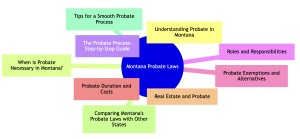
Retiring in Montana: Advice From An Elder Law Professional
January 17, 2024
Navigating Special Needs Trusts: A Guide for Seniors and Their Families
January 17, 2024Probate in Montana stands as a critical legal framework for its citizens, guiding the distribution of a deceased person’s estate. This process ensures that assets are allocated according to the decedent’s wishes or state law and that all debts are settled. For beneficiaries and executors, a deep understanding of Montana’s probate laws is essential for navigating the complexities of estate management and ensuring a smooth transition of assets.
Key Takeaways:
- Probate’s Purpose: Essential for legal asset distribution.
- Executor’s Role: Executors oversee the entire probate process.
- Beneficiary Rights: Beneficiaries are entitled to their fair share.
- Exemptions Available: Certain estates may bypass probate.
- Process Steps: Understanding each phase of the probate process.
Understanding Probate in Montana
Probate is the judicial process that validates a deceased person’s will and oversees the distribution of their estate. It’s a safeguard that ensures assets are distributed fairly and debts are paid. This process is pivotal in estate management, serving as a bridge between the deceased’s wishes and the legal transfer of assets.
Table 1: Probate’s Role in Estate Management in Montana
| Aspect | Description | Key Details |
| Legal Validation | Confirms the authenticity of wills. | – Involves verifying the will’s legality.
– Ensures the will reflects the decedent’s true intentions. – Identifies the rightful executor. |
| Asset Distribution | Oversees the fair allocation of assets. | – Identifies and catalogs all estate assets.
– Assesses the value of each asset. – Distributes assets to beneficiaries as per the will or state law. |
| Debt Settlement | Ensures all debts and taxes of the estate are paid. | – Identifies outstanding debts and taxes.
– Prioritizes debt payment from the estate’s assets. – Protects beneficiaries from personal liability for estate debts. |
When is Probate Necessary in Montana?
In Montana, the probate process becomes a necessity under several circumstances, primarily when a deceased individual leaves behind assets that require legal transfer. This situation often arises when assets are solely registered in the deceased’s name and lack a designated beneficiary. It’s a common scenario, especially in cases where estate planning might not have been thoroughly addressed.
Probate also steps in when there’s ambiguity or contention surrounding a will. Disputes over a will’s validity, its interpretations, or its execution can only be settled through the probate process. This legal intervention ensures that the decedent’s wishes are honored and that all parties involved are treated fairly according to the law.
Criteria for Probate in Montana:
- Estate Value:
- Montana law sets specific value thresholds that determine whether an estate must go through probate.
- If the total value of the estate exceeds these limits, probate is required to ensure a lawful transfer of assets.
- Asset Ownership:
- Assets solely owned by the deceased are a primary trigger for probate.
- This includes real estate, bank accounts, stocks, and personal property that are in the decedent’s name only.
- Will Disputes:
- Probate is the legal arena for resolving disputes over a will.
- Whether it’s contesting the will’s validity, interpreting ambiguous clauses, or managing conflicts among beneficiaries, probate provides a structured process for resolution.
Understanding these criteria is crucial for executors and beneficiaries. It helps in preparing for the probate process and ensures that all necessary steps are taken to comply with state laws. By recognizing when probate is necessary, individuals can better navigate the complexities of estate settlement, ensuring a smoother transition of assets and reducing potential conflicts.
The Probate Process: Step-by-Step Guide
The probate process is a multi-step procedure that ensures the legal and fair distribution of an estate.
- Filing the Petition: Initiating probate in court.
- Notification: Informing heirs and creditors.
- Inventory: Cataloging the estate’s assets.
- Debt Settlement: Paying off debts and taxes.
- Asset Distribution: Distributing assets to beneficiaries.
Roles and Responsibilities in Montana Probate
Executor Duties
In Montana’s probate process, the executor assumes a vital role. Their responsibilities begin with filing the probate petition, a step that officially initiates the legal proceedings. They are also tasked with notifying all beneficiaries and creditors, ensuring that everyone with a stake in the estate is informed.
The executor’s role extends to the meticulous management of the estate’s assets, which includes safeguarding property, overseeing its valuation, and ensuring its proper maintenance.
Additionally, they are responsible for settling any debts and taxes owed by the estate, a task that requires careful financial management. The culmination of their duties is the distribution of the inheritance, which must be done in accordance with the will or, in the absence of a will, state law. This role requires a balance of diligence, fairness, and adherence to legal standards.
Beneficiary Rights
Beneficiaries in the Montana probate process are entitled to certain rights. Primarily, they have the right to be informed about the estate’s proceedings, which includes regular updates on the status of the probate process and details about the estate’s assets. They are also entitled to receive their inheritance in a timely manner, as undue delays can lead to complications and distress. Crucially, beneficiaries have the authority to challenge decisions or actions taken during the probate process if they believe that the estate is not being managed fairly or in accordance with the law.
Probate Exemptions and Alternatives
Montana’s probate law provides alternatives for simpler and smaller estates, facilitating a more streamlined process.
Small Estate Affidavits
For estates that fall below a certain value threshold, Montana law allows the use of small estate affidavits. This option bypasses the formal probate process, simplifying the transfer of assets and reducing the administrative burden.
Summary Administration
This process is tailored for smaller, less complex estates. It offers a more streamlined approach to probate, reducing the time and paperwork typically required in standard probate proceedings.
Exempt Assets
Certain types of assets, such as those held in joint tenancy or those with designated beneficiaries, are exempt from the probate process. This exemption allows for a direct and immediate transfer of these assets to the surviving owners or named beneficiaries, bypassing the need for probate and simplifying the estate settlement process.
Probate Duration and Costs
The duration of probate in Montana typically ranges from six months to over a year, depending on the estate’s complexity. This timeframe is crucial for executors and beneficiaries to understand, as it impacts how soon assets can be distributed. The costs associated with probate in Montana can vary but often include several key expenses.
Breakdown of Probate Costs:
- Court Fees: These are fixed costs required for filing and processing the probate case.
- Attorney Fees: Legal advice is often necessary, and fees can vary based on the estate’s complexity.
- Executor Fees: Compensation for the executor’s time and effort in managing the estate.
- Appraisal Fees: Costs for professional valuation of estate assets.
- Miscellaneous Expenses: This may include costs for accounting, tax preparation, and other administrative tasks. (1)
Real Estate and Probate
Handling Real Estate in Probate
Dealing with real estate in probate involves several steps, including valuation, addressing any mortgages or liens, and transferring the property to the rightful heirs or beneficiaries. This process can be complex, especially if the property is not explicitly mentioned in the will.
Joint Tenancy in Real Estate
Properties held in joint tenancy pass directly to the surviving owner(s), bypassing the probate process. This arrangement is common among spouses and can simplify the transfer of property.
Transfer on Death Deeds
Montana allows property owners to use Transfer on Death Deeds (TODDs). These deeds enable direct transfer of real estate to a named beneficiary upon the owner’s death, avoiding probate for the property.
Comparing Montana’s Probate Laws with Other States
Montana’s probate laws are known for their relative simplicity and lower costs compared to more complex systems like those in California or New York. However, understanding these differences is key for executors and beneficiaries, especially those dealing with interstate estates.
Table: Comparison of Probate Laws
| State | Complexity | Cost | Process Duration | Notable Features |
| Montana | Less Complex | Lower | 6-12 Months | Simplified process for small estates; TOD deeds available. |
| California | More Complex | Higher | Varies | Lengthy process; high attorney fees. |
| New York | More Complex | Higher | Varies | Stringent rules; lengthy proceedings. |
| Texas | Moderate | Moderate | 6 Months+ | Independent administration option for simpler processing. |
| Florida | Moderate | Moderate-High | 3-6 Months+ | Summary administration for smaller estates. |
| Ohio | Moderate | Moderate | 6-12 Months | Simplified procedures for small estates. |
| Illinois | Moderate-High | Moderate-High | 9-12 Months+ | Probate required for estates over $100,000. |
| Washington | Less Complex | Lower-Moderate | 6 Months+ | No probate for small estates; simplified options. |
Tips for a Smooth Probate Process
A smooth probate process hinges on proactive estate planning, seeking competent legal advice, and meticulous record-keeping. These steps can significantly reduce the duration and complexity of probate.
Effective Probate Strategies:
- Advance Planning: Essential for reducing probate complexities.
- Seek Expert Advice: Legal professionals can navigate probate nuances.
- Maintain Detailed Records: Organized documentation facilitates asset management and dispute resolution.
Wrapping Up
Montana’s probate laws, known for their relative simplicity compared to states like California or New York, still require careful navigation. This is where the expertise of Montana Elder Law becomes invaluable. As specialists in estate planning and probate law, Montana Elder Law offers a guiding hand through this intricate legal landscape. Their team of experienced professionals provides personalized support, ensuring that the probate process is as smooth and stress-free as possible.
Whether you’re an executor overwhelmed by the responsibilities ahead or a beneficiary seeking clarity on your rights and entitlements, Montana Elder Law is equipped to provide the assistance you need.
(Click HERE to gain more information.)
They stand out not only for their legal acumen but also for their compassionate approach to each case. Understanding that probate can be a sensitive and emotional journey, they offer a service that combines professional excellence with empathy and understanding.
References:
(1) The Probate Process, The American Bar Association, https://www.americanbar.org/groups/real_property_trust_estate/resources/estate_planning/the_probate_process/#:~:text=Probate%20is%20the%20court%2Dsupervised,the%20terms%20of%20your%20will.


